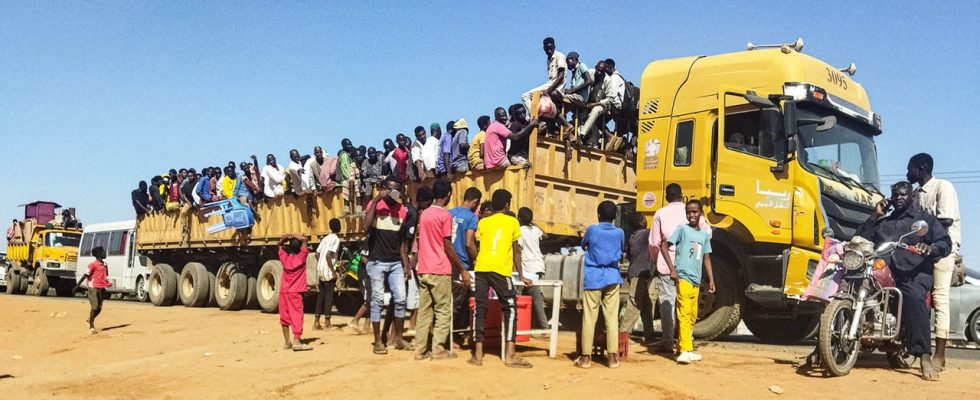Sudan’s army and the paramilitary RSF have been fighting each other for eight months. Thousands are dead, hundreds of thousands are on the run. Experts criticize: The world looks away – so as not to endanger other alliances.
Nasik Abou Zaid listens to the news on her cell phone. The Sudanese doctor is chairwoman of “Doctors for Human Rights”. She normally heads the non-governmental organization’s office in the Sudanese capital Khartoum and looks after the sick and trauma patients. But like many of her compatriots, the Sudanese doctor fled the fighting in Sudan to neighboring Egypt eight months ago.
In her homeland, she says, the healthcare system has collapsed and more than 90 percent of all medical care has been stopped – especially in the areas where the conflicts are taking place.
The second or third expulsion
The fighting between the Sudanese army and the paramilitary Rapid Support Forces (RSF) is expanding. At the beginning of the power struggle between the de facto head of state and army chief Abdel Fattah al-Burhan and the former deputy ruler Mohammed Hamdan Daglo, the fighting took place primarily around Khartoum and in the Dafur region in western Sudan.
In recent weeks, the RSF fighters under Daglo’s leadership have also advanced into the state of Yetzira, southeast of the capital. As a result, even more people are on the run, says Adnan Hizam, a spokesman for the International Committee of the Red Cross:
In recent weeks, hundreds of thousands of Sudanese have been displaced in search of safety and shelter, for some of them this is their second or third displacement. We are now dealing with more than six million internally displaced people. This is a record in the history of Sudan, which has suffered from many conflicts.
Sudanese army is inferior
War, expulsion, hunger: many of the more than 45 million Sudanese have been familiar with this for decades. The current reports from those fleeing are shocking – of destroyed villages, looting and rape.
Both sides are accused of war crimes, but the fear of the RSF militia is particularly great, confirms Abu Zaid: “In order to drive the families from their homes, they threaten to rape them. Now people know that, and if RSF militias are in the If they attack nearby, they take their daughters and flee.”
Sudan analyst Roman Deckert has been working on Sudan for more than 25 years and currently works for the Berlin-based non-governmental organization MiCT. He is concerned that the militia is spreading further and further. “The regular army is such a bad army, in every respect, morally and technically, that it is vastly inferior on the battlefield,” he says. “It looks as if Daglo and his militias could take over the entire country.”
It is fitting that millennium leader Daglo has apparently recently been on a diplomatic mission in the region, most recently in Ethiopia, supposedly to hold talks about ending the war. But more likely to position himself as a legitimate ruler, says Deckert.
He fears that the situation will get even worse for the people in Sudan if the RSF takes over the country: “What this means for the people is that, first of all, there is a threat of a phase of terror in which they are not secure in their lives lose their belongings.”
The country feels forgotten by the world
However, Deckert estimates that Sudan’s regular army will not give up so easily. Army chief Al-Burhan is supported by Egypt and Saudi Arabia, while the RSF militia is supported by the United Arab Emirates. A classic proxy war, says the Sudan analyst.
Decker finds it particularly bitter that the West is turning a blind eye to the conflict in Sudan: “Here we have to admit that the USA and the European states have different priorities. The United Arab Emirates are simply too important as an ally” – not least because Gulf state supplies liquefied gas to Germany.
Sudanese doctor Abou Zaid also has the feeling that the world has forgotten Sudan. In addition to medication for diabetes or high blood pressure, there is a lack of special food for malnourished children. In some areas, she warns, aid organizations can hardly provide for the people.
Nina Amin, ARD Cairo, tagesschau, January 5th, 2024 7:07 a.m

